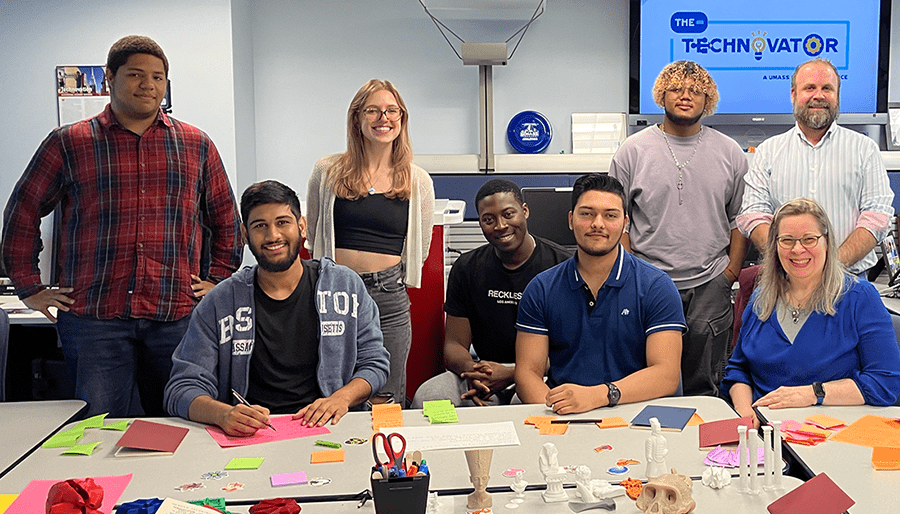
Technovation–Still Successfully “Failing” Forward
It would be impossible to name the single most impressive service that UMass Boston IT has introduced the past few years, but Zack Ronald’s Technovation office must be among the top contenders. “We’ve sort of established ourselves as a way that students, faculty, staff, and researchers can come to us for innovative tools for teaching/learning, and the thing that Ray (Chief Information Officer Raymond Lefebvre) likes to emphasize about Technovation is low cost, scalable and fail forward,” Ronald said in commenting on the impact Technovation has had in its brief history at the university. Technovation, launched at UMass Boston in 2019 by Lefebvre, has grown significantly with the Technovator lab/office space in the Wheatley building coming online in September 2021.
Previous IT Outcomes’ editions have described some of Zack’s earlier technovations, including the stupendous Old North Church virtual reality project Virtual 360 Tour | The Old North Church, but the hits have continued coming this past year. As always, the focus has been on educational technology, or Ed Tech. Zack’s main passion is finding innovative ways to use technology to enhance how faculty teach and students learn at UMass Boston, and he always wants to make sure that the university is at the forefront of where Ed Tech is heading. As he puts it, “Wherever higher Ed is going, that is where we want to go too. We are trying to stay with the curve.” And where is the curve these days? “Design thinking, 3D printing, virtual reality, augmented reality, artificial intelligence, that’s where the world is going,” he said, before describing the ways in which his office has kept up with, if not gotten ahead of, these trends over the past year.
First is 3D printing, which seems incongruous to many people just because of what it is called. It is a good thing that part of Zack’s genius is his ability to explain what is extremely complex in a way that even the non-technical among us can understand. “The way 3D printing is used here is to take a design of an object, either something that’s already available online or is designed from scratch, you put it into something called a slicer, which designs how many layers and pieces that it has, and then you send it to the 3D printer and print it out.” The key is in knowing that the word “printer” is a misnomer.
What that machine actually does is produce plastic parts designed with precise specifications so that when assembled useful tools for classroom learning are created. A recent example was the creation of reusable intravenous tubes for the nursing school to replace ones that were only used once and then had to be disposed.
Zack dispelled the notion that this technology is only useful for aiding STEM education at UMass Boston, and he described ways it has been used for instruction in art, history, and other liberal arts disciplines. He acknowledged though that Technovation has worked more closely with the nursing school than any other academic department, mostly because there are so many ways to apply innovative technologies that have been discovered in nursing education. In particular, virtual reality (also known as immersive or augmented reality) has transformed the way nursing is now taught at the university.
“The nursing program is always on the forefront of innovative education. They are always trying to find the next best thing because they see that their students need innovative approaches as well. The big thing that we have done this year was virtual reality,” Zack explained. The nursing profession being what it is, students benefit tremendously if they can experience being in settings such as emergency rooms, surgical rooms, or even handling certain equipment. “We piloted two different virtual reality tools for simulation with (Nursing Clinical Lecturer) Rosemary Samia and her group. We trained the nursing faculty on it and were there for support, getting things up and running,” Zack said before adding that the nursing team was so happy with the result, “they went out and they bought an additional 12 virtual reality headsets for the department.”
Technovation has proven itself to be an invaluable asset to UMass Boston, and it is great to know the university will be leading the way through Technovation under Zack Ronald’s leadership for many years to come.